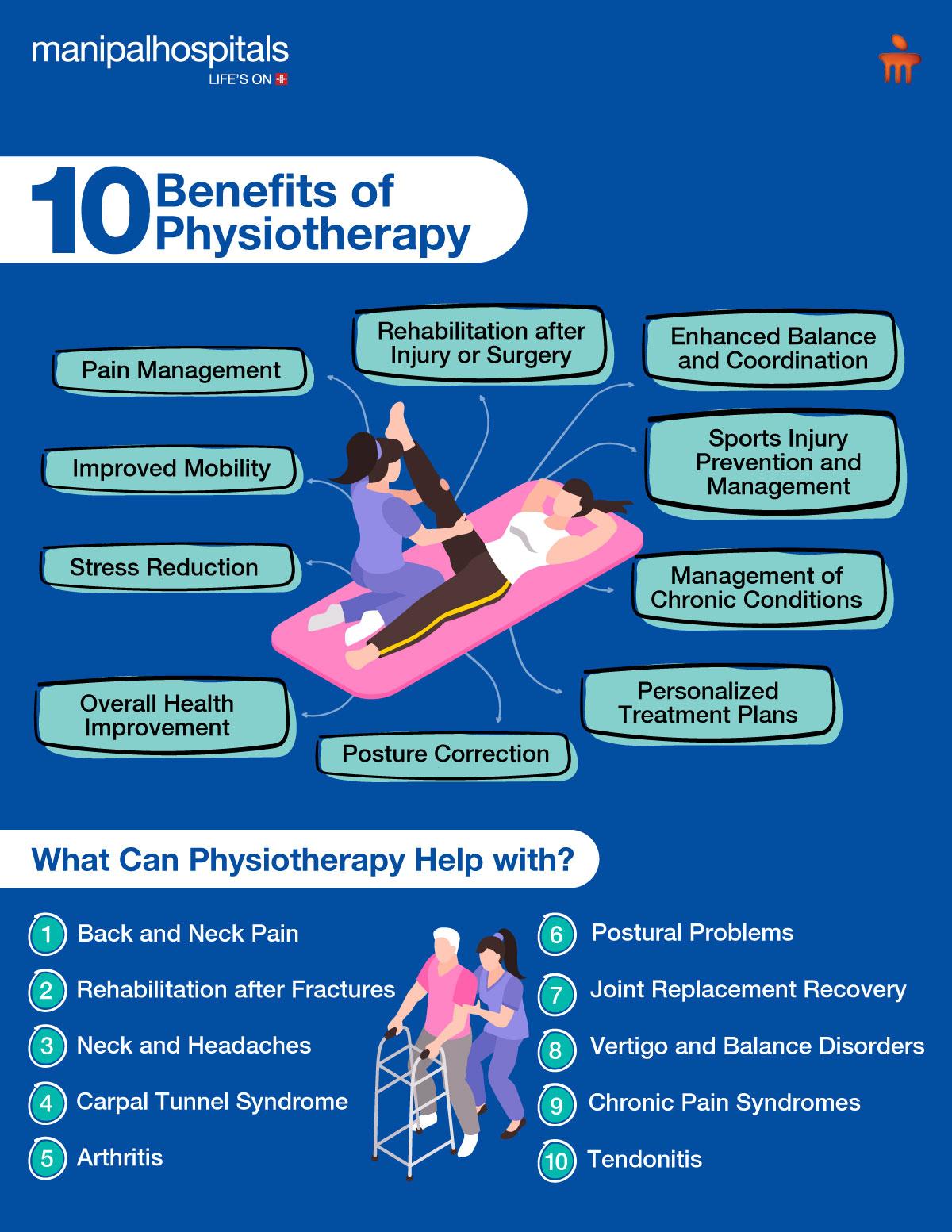
Have you ever experienced persistent pain, limited mobility, or a nagging injury that just won't go away? Many of us have encountered such challenges, hindering our ability to lead a fulfilling and active life. The solution to these issues often lies in the realm of physiotherapy. Therefore, the search for effective solutions to these issues is a universal quest. This is where physiotherapy steps in, offering a multifaceted approach to address these concerns and elevate our quality of life. Let's unlock the doors to healing and discover how physiotherapy can significantly improve our overall well-being.
Synopsis
What is Physiotherapy?
Physiotherapy, also known as physical therapy, is a healthcare profession aimed at improving and restoring physical function and mobility. It involves various techniques and exercises that help individuals recover from injuries, manage chronic conditions, and prevent future health problems. Physiotherapists are trained professionals who assess, diagnose, and treat conditions related to muscles, bones, joints, and the nervous system.
Conditions Treatable with Physiotherapy
The scope of physiotherapy is extensive, covering various conditions and ailments. It is effective in addressing:
-
Musculoskeletal Issues: Treats injuries or disorders affecting muscles, bones, ligaments, and tendons, such as back pain, arthritis, and sports injuries.
-
Neurological Conditions: Helps manage conditions like stroke, multiple sclerosis, Parkinson's disease, and spinal cord injuries by improving mobility and function.
-
Cardiovascular Conditions: Assists in cardiac rehabilitation, supporting individuals recovering from heart attacks or heart surgeries to regain strength and endurance.
-
Respiratory Problems: Aids in managing breathing difficulties in conditions like asthma, chronic obstructive pulmonary disease (COPD), and cystic fibrosis through breathing exercises and chest physiotherapy
10 Benefits of Physiotherapy

-
Pain Management: Physiotherapy employs various techniques like manual therapy, exercise, and modalities such as cold laser therapy to alleviate pain and promote healing.
-
Improved Mobility: Through targeted exercises and interventions, physiotherapy enhances flexibility, range of motion, and overall mobility, crucial for daily activities.
-
Rehabilitation after Injury or Surgery: It aids in post-injury or post-surgery recovery by restoring function and strength to the affected area, ensuring a quicker and more effective recovery.
-
Enhanced Balance and Coordination: Physiotherapy exercises and balance training reduce the risk of falls, particularly in elderly individuals, by improving coordination and stability.
-
Management of Chronic Conditions: It offers long-term relief for chronic conditions like arthritis, fibromyalgia, and lower back pain, helping patients manage symptoms and improve their quality of life.
-
Sports Injury Prevention and Management: Athletes benefit from physiotherapy in preventing injuries, optimizing performance, and facilitating faster recovery from sports-related injuries.
-
Personalized Treatment Plans: Physiotherapists create tailored plans considering individual needs, ensuring targeted and effective treatment.
-
Stress Reduction: Engaging in physiotherapy exercises and activities often reduces stress levels, promoting mental well-being alongside physical health.
-
Posture Correction: Correcting poor posture through exercises and ergonomic advice can alleviate chronic neck and back pain caused by improper alignment.
-
Overall Health Improvement: Physiotherapy contributes to overall health by promoting an active lifestyle, fostering independence, and improving quality of life.
How Physiotherapy Can Help You?
Physiotherapy encompasses a wide array of treatments and interventions, including:
-
Manual Therapy: Hands-on techniques like massage, manipulation, and mobilization to improve mobility and reduce pain.
-
Exercise Programs: Tailored exercises to strengthen muscles, improve flexibility, and enhance endurance.
-
Cold Laser Therapy: Utilizing low-level laser light to reduce pain, and inflammation, and promote tissue healing.
-
Electrical Modalities: Techniques such as ultrasound, TENS (Transcutaneous Electrical Nerve Stimulation), and electrical stimulation for pain relief and tissue repair.
-
Education and Advice: Guiding ergonomics, lifestyle modifications, and preventive measures to manage conditions effectively.
What Can Physiotherapy Help with?
Healthcare physiotherapy can address a myriad of issues, including:
-
Back and Neck Pain.
-
Postural Problems.
-
Rehabilitation after Fractures.
-
Joint Replacement Recovery.
-
Neck and Headaches
-
Vertigo and Balance Disorders.
-
Carpal Tunnel Syndrome
-
Tendonitis
-
Chronic Pain Syndromes.
Consult our physiotherapist in Goa if you need to know more about the advantages of physiotherapy.
Conclusion
Physiotherapy is a comprehensive healthcare discipline offering numerous benefits that transcend mere recovery from injuries or ailments. Its holistic approach towards enhancing physical well-being, managing chronic conditions, and promoting overall health makes it a pivotal component of modern healthcare. Embracing physiotherapy empowers individuals to lead healthier, more active lives, restoring function and vitality.
Before starting any physiotherapy regimen, it's crucial to consult a qualified physiotherapist for a personalized physiotherapy treatment plan, Manipal Hospitals, Goa can help you take care of your specific needs and conditions.
FAQ's
Some physiotherapy techniques may cause slight discomfort but shouldn't be painful. Communicate openly with your physiotherapist if you experience any pain. They can adjust the treatment accordingly.
The duration of treatment depends on your specific condition and goals. Your physiotherapist will create a personalized treatment plan based on your needs, ensuring optimal recovery.
Yes! Physiotherapists can teach you exercises and strategies to improve your strength, flexibility, and balance, significantly reducing your risk of future injuries.
You should wear loose, comfortable clothing that allows the physiotherapist to examine the affected area easily. Think sweatpants, shorts, and a loose-fitting shirt.



















 5 Min Read
5 Min Read










